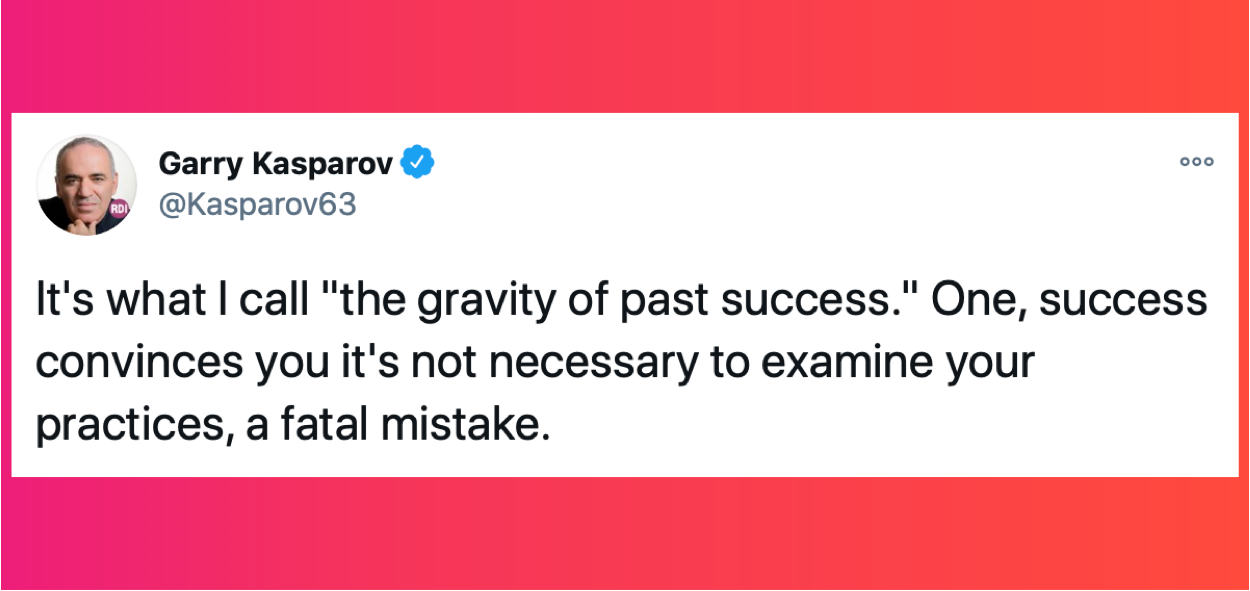Unlearn your Winning Moves
Leadership Blog | 4 minute read

Written by Mike Straw


If it ain’t broke…
Of course, it is very hard, almost impossible to put aside the strategies, behaviours and approaches that have been successful so far. We call them ‘Winning Moves’ because throughout our lives they have been effective in getting us the things we want. Why change things that have been working for so long? For businesses this is often articulated as the risk of adopting innovative approaches versus the stability of proven markets, products and channels. For individuals it is different. Our ‘Winning Moves’ are not a defined strategy or playbook, but a complex arrangement of beliefs, actions and behaviours that are deeply embedded in the way we are.
For most of us our Winning Moves are unconscious. We have built them for ourselves bit by bit throughout our lives, through trial and error and experience. They are part of who we are and our ways of being. When we encounter situations we instinctively listen and look for how we can deploy our winning moves and remain consistent with our view of how the world should work. For the most part this has been a highly effective way to succeed. But as Chess Grandmaster Garry Kasparov once remarked, the temptation to stick with the status quo leads to stagnation.
“When you are already doing well the temptation to stick with the status quo can be overwhelming, leading to stagnation.”
- Garry Kasparov, Chess Grandmaster
The groove becomes first a rut and finally a grave
The challenge is that whilst we are in our ‘groove’ we are blind to the alternative possibilities that exist. As John Paul Getty said. “The groove becomes first a rut and finally a grave.” This is the lesson that many formerly successful businesses are learning too late, as the world around them undermines and ultimately destroys the circumstances in which their strategies worked. Internet shopping and next day delivery radically transformed the retail environment long before the COVID pandemic shuttered bricks and mortar stores.
Unlearn your own winning moves
Corporate examples are easy to see, but Winning Moves are just as powerful for individuals and represent the same risk. We unconsciously develop a commitment to our winning moves that might not always serve us as circumstances change. Our natural response when faced with change, or situations where things seem not to be working out is to defend and focus in on what we know to have worked in the past. But this leads to stress as the gap between expected results and reality grows. The successful leader, just like the successful business, uses times of change to step-outside of their way of being to reassess what will lead to success in the future.
The ability to unlearn what has made you successful to date is fundamental to the breakthrough thinking that allows leaders to envision and deliver new futures that others deem impossible. Understanding and acknowledging that you have a set of winning moves which shape your thinking and behaviour is the first step. They are not wrong, and they have served you well, but holding too tightly to them prevents you from seeing new moves that could work better.
Listen for the questions you always ask
To reveal our unconscious winning moves it is helpful to question the questions we usually ask. The little voice in our heads is always prompting us to ask the questions that open the door to our winning moves. Challenging ourselves to look beyond these can help us step outside of these routines and identify new approaches. Imagine a new CEO joining the organisation of you – how would they look at your winning moves, and what would they change? What is the conventional wisdom they would challenge and what new ideas could they bring from outside?
It will be difficult and intellectually demanding, but consciously becoming aware of your preferred winning moves delivers new choices. Things which have been accepted as impossible can become achievable. New potentials can be created and new futures envisaged when leaders free themselves from the constraints of established winning moves. The exhaustion and stress of constantly striving to fit a changing world into the static framework of what has worked before is replaced by energy and the possibility of new ways of being.
The temptation for any leader facing times of change is to focus back on what they know has worked. But unlearning what has made you successful so far and stepping outside of the tried and trusted, will lead to what Gary Kasparov calls, “Beautiful or paradoxical moves that were not on your initial list of candidates,” and lead to new success.
Published 21/01/2021
Subscribe by Email
Achieve more breakthroughs. Get expert leadership ideas, insights and advice straight to your inbox every Saturday, as well as the occasional bit of news on us, such as offers and invitations to participate in things like events, webinars and surveys. Read. Lead. Breakthrough.
Tags
- Attracting talent
- Behaviour change
- Blended Learning
- Breakthrough Thinking
- Business partnering
- Career planning
- Change management
- Collaboration
- Communication
- Competitive strategy
- Creativity
- Decision making
- Developing middle management
- Developing millennials
- Developing talent
- Employee engagement
- Entrepreneurship
- High performing teams
- Hiring
- Human Resource Management
- Innovation
- Leadership development
- Learning technology
- Managing people
- Managing uncertainty
- Managing yourself
- Mergers & Acquisitions
- Mindset
- Motivating people
- Negotiation
- Organisational culture
- Organisational development
- Organisational values & purpose
- Performance management
- Productivity
- Programme Management
- Retaining talent
- Strategic thinking
- Strategy
- Strategy execution
- Succession planning
- Team development
- Work-life balance
Related posts
Leadership Blog
Why organisational agility starts with mindset, not operating models
Achieve Breakthrough | 17/02/2026
Leadership Blog
Curiosity as culture: The social glue of high-performing teams
Achieve Breakthrough | 10/02/2026
Leadership Blog
Why better questions build better teams: The cultural case for curiosity
Achieve Breakthrough | 03/02/2026
Leadership Blog
Leading with the handbrake off: Why curiosity is a strategic operating system for uncertainty
Achieve Breakthrough | 27/01/2026
